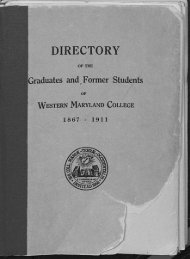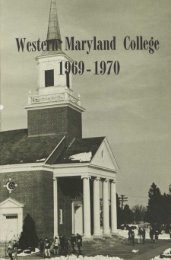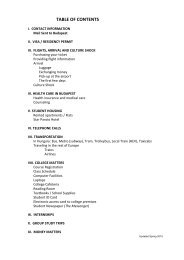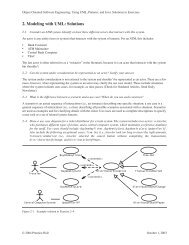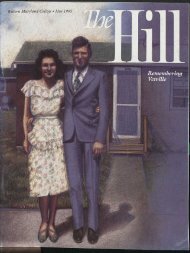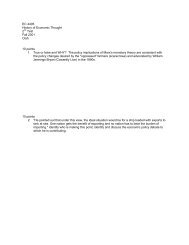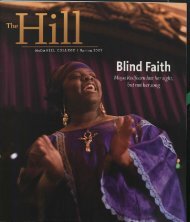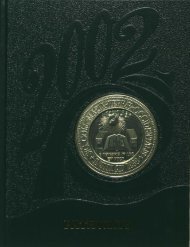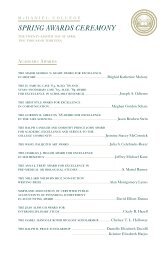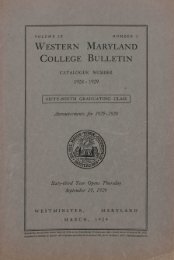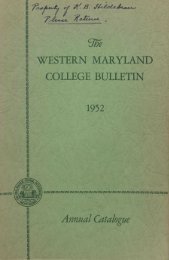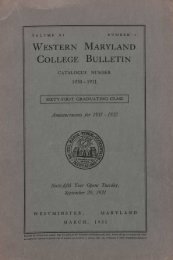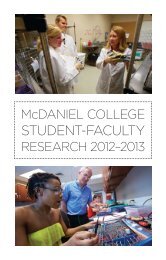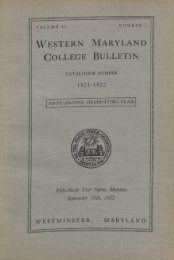"A High School With Dormitories"by Richard D. McCall, '68Students at Western Maryland Collegespend anywhere from one to five hours aday in structured time-wasting. This representsone to five hours which could be spentin research, study and dialogue; that is, ingetting an education.We arc not lazy; we are not frivolous.We are, in many cases, serious students.We do not wish to waste so much of ourcollege eclucation. The unfortunate fact isthat we are forced to.Every day we are forced to sit in neatlittle rows and appear to be paying attentionwhile a gentleman, whose name invartablyends with the letters, M.A., orPh.D., reads out of a notebook. Some ofus yawn, some write letters, some read atextbook (this allows us to predict whatthe man will say next), and others copydown, with varying degrees of accuracy, thewords which the man is reading. We dothis in order to write them from memoryat some future date, to give them back tothe man in return for a letter drawn inred ink. Our task is to regurgitate facts. Itis strange, is it not, that we do not justborrow the gentleman's notebook and copyverbatim his sacred utterances.Our disgust with the classroom situationgrows out of the demands which our educationmust meet in the modern world. If itcould be argued that we are preparing to.meet the future by going to classes, perhapswe could be more patient. The TwentiethCentury accepts no memorized textbook answersto its problems, however. The rest ofpagefenour lives cannot be spent memorizing andregurgitating.The present system prepares us neitherin method nor content for taking any slg,nificant creative role in the world. Insteadof giving an opportunity for individualinitiative and research, the system fosterspassive absorption of data. Instead of helpingus learn and evaluate facts and usethem in the fonnutation of new insightsand ideas, the system rewards mere memorizationof certain isolated facts which weexpect to flnd on the next test,The student is passive; we listen, weread, we memorize. Even if we wish to discussand debate there is great difficulty inflnding -cmeone with time to leave thegrade-grabbing cycle and engage in criticaldiscussion. Little wonder then that we forgetmost of what we learn two weeks afterthe test. It is a psychological fact that themore a person actually does, the more activehe is, the more he learns and the more heretains what he learns.The classroom, far from being a place ofactive thinking, is condUCive, to a remark,able degree, to sleep. There arc some whoattempt 10 blame this classroom somnabulao.n students, saying that we could, by queshomand
To Catcha Fish byD,,;dLC.rrasco,'67As we stood tnlkmg one evening next to the wooden house (three rooms all stilts)where another S.O.S. worker and I lived, the young Puerto Rican school teacher told mewhat S.O.S. was all about. Short, muscular Romualdo Martinez, who had fought in theKorean conflict and whose English was the most adequate I'd heard in the barrio, spokewith enthusiastic determination. His eyes and words penetrated my own realm of thought."As I was trying to tell the people of EI Coco this last evening when we explainedthe sanitation program, we do not want to give them the 'Bsh' but we want to teachthem 'how to catch the fish: I'm not so sure that your program is doing this. 'Ve cannotjust bring trucks and men here to take away their trash. We have to teach themthe method of trash removal without depending on bucks or the government or on yourpeople. The people themselves must be taught the concept, the idea. We must communicatethe meaning of sanitation to them. That is what I mean when I say we mustteach them 'how to catch the fish: Without this kind of a program significant contributionis automatically limited."While the S.O.S. is working in communitydevelopment trying to teach people 'how tocatch a 6sh,' the volunteers themselves arelearning what it means to be a fisherman.Today, on the campus, there are moreand more students and professors (and, onoccasion administrators) who are trying tolearn 'hew to catch a fish.' Don't take theanalogy on all fours. But, the silent generationhas become a restless one and is bellowingout some rather profound and farreaching groans.College students are standing up to becounted, sitting in for results, getting o~tto be responsible, marching forward Insearch of change and authenticity. That iswhat is involved in catching Martinez' fish.He was talking about the lifeblood of theeducational experience.The unrest on the campuses across thenation and the unrest on Western Maryland'scampus is Ior the most part a positiveresponse to some very negative conditions.Irving Kristole, in his article "What's buggingthe student" writes it very plamly,possibly too plainly for members of thesilent generation to digest. "It is above ~1I,an existentialist revolt (see November 65issue of THE MAGAZINE). The term isunfortunately chic and ambiguous. But inthis context it has a fairly definite meaning.The students are in rebellion not so muchbecause things are bad for them or forothers, but because things are the way theyare for them and for others. They arebored."Roland Liebert in his article, "The ProtestMood of Students," carries the idea furtherand says it with more clarity. "Nearly .aUcampus protests, while themselves. beingconsidered by students a form of socml service,have served as well to strengthen theopportunities for the continued growth ofthis ethic in new areas." He is speaking ofthe ethic of social service which is the mostcreative facet of the protest movement. It isprotest and demonstration transmuted intoservice-active service.Western Maryland is not without its negativeconditions to be sure, but more importantis that it has had some gut-level unrestand demonstrations in the form of the S.O.S.movement, the tutoring projects on Unionand Charles Streets, the teach-in on Vietnam,the pilgrimage of concern which sawfour students spend their spring vacationshelping Negroes in the South register tovote, the statement and position paper onfraternities and the May Day demonstration.my fellow students would say,As one ofthere arc waves in the bathtub.One merely needs to look past the glorifiedfacade of the S.O.S. to recognize that thefield projects are statements of protestagainst traditionally dull status quo. Theorigin Student Opportunities Service is aofcase in point. A visiting lecturer. accused thecollege generation of being uncommitted,uninvolved and narrow. This was in 1963and students on the Hill looked around ateach other, at what the College had to offer,and saw that it was true. A handful gatheredwith a concerned professor and demonstratedtheir defiant attitude by organizinga service orga~ization and by launchingOperation Philippines the same year. Asthis article is being written there are 21volunteer workers in Puerto Rico and Appalachialiving out the ethic social service.ofThe fact that Western Maryland has beenrepresented in the Philippines, in the Antilles,in Appalachia by field service teamsconsisting of students who finance their owntrips, organize their own training, initiateand co-ordinate projects with citizens in thebarrios where they live, is a demonstrationof youth searching for reconciliation and achance to serve. The plain fact, that thepage eleven
- Page 1 and 2:
~~STERN MARYLAND COLLEGE I ~~o/ht~W
- Page 3 and 4:
TheWESTERN MARYLAND COLLEGEMagazine
- Page 5 and 6:
A Gift forthe CollegeCollectionBalt
- Page 7 and 8:
meat aU choice cuts. From this poin
- Page 9 and 10:
.'30to 40 miles for clinics on the
- Page 11 and 12:
PAINT POSTSTHE CATALYSTPledges of G
- Page 13 and 14:
On the Hit!New TrusteeArthur G. Bro
- Page 15 and 16:
Hopkins TakesLast GameBasketball te
- Page 17 and 18:
19"Mrs. Otto Dieffenbach(Madeleine
- Page 19 and 20:
Wayne Crackel! works for the YMCA i
- Page 22 and 23:
The President's ColumnTribute toMan
- Page 24 and 25:
Communication is many things; telep
- Page 26:
period of old age, it might be cons
- Page 29 and 30:
-- •Pagenine
- Page 31 and 32:
Art is long they sayAnd the time is
- Page 33 and 34:
Members of the Fund Committee meet
- Page 35 and 36:
SPORTSClower's TearnHas TroubleUnli
- Page 37 and 38:
During a recent dinner party at Car
- Page 39 and 40:
SUpport equipment engineering divis
- Page 41 and 42:
infant in March, 1964. She is also
- Page 43 and 44:
portunity tool) StanleyHowell an El
- Page 45:
cral science and biology.Thank you
- Page 48 and 49:
Dasuet McCready, president of the W
- Page 50 and 51:
The bridge is a symbol in literatur
- Page 52 and 53:
Thi.s i.s one of th.e chemistry lab
- Page 54 and 55:
Moberly wrote, "An honest intention
- Page 56 and 57:
all sorts of odd jobs such as peddl
- Page 58 and 59:
I".,"".'""""~ silentlv.unnoticej'~,
- Page 61 and 62:
of scientists and engineers that ou
- Page 63 and 64:
y, but 15 years ago there were roug
- Page 65 and 66:
problems, and to international conf
- Page 67 and 68:
DRA WINGS BY ARNO STERNGLASSconsequ
- Page 69 and 70:
The students reactto "the system" w
- Page 71 and 72:
The alumnilament: We don't Tecogniz
- Page 73 and 74:
William S. Coffin, Jr.Campus Respon
- Page 75 and 76:
SPORTSTERROR NINEIS DIFFERENTCoach
- Page 77 and 78:
serving as interim Pastor of a smal
- Page 79 and 80:
travel. The next newsletter will te
- Page 81 and 82:
this summer. \Vhile there, they wil
- Page 83 and 84:
The MagazineServiceCommencementCrec
- Page 85 and 86:
TheWESTERN MARYLAND COLLEGEMagazine
- Page 87 and 88:
Sally Reinecke chats with students
- Page 89 and 90:
Thie is the Trapper Creek Job Corps
- Page 91 and 92:
BOLIVIAPIONEER(S)by Joy Holloway, '
- Page 93 and 94: Joy says "Welcomethe right.to San P
- Page 95 and 96: '/'his article, printed in the May
- Page 97 and 98: June 6, 1966, Commencementpage-fift
- Page 99 and 100: DepartmentsGive HonorsTwenty-one me
- Page 101 and 102: y David Carrasco, '67RAIN HINDERSTE
- Page 103 and 104: ~~h:~~;~1i~~~lf. ft~l~~b/:~:~~:~n (
- Page 105 and 106: Nova Scotia, Gaspe Peninsula and Qu
- Page 107 and 108: Maryland National Guard's "Dandy Fi
- Page 109 and 110: Family Living at North Hagerstown H
- Page 111 and 112: the birth of their first child, Kei
- Page 113: Andy was bam in the morning on the
- Page 117 and 118: TheWESTERN MARYLAND COLLEGEMagazine
- Page 119: AlumniFund Breaks RecordThis succes
- Page 122 and 123: -,Martha O. VincentPaul F. W!L"'~r'
- Page 124 and 125: 11133-$997.00·"Webster M. Stray~rF
- Page 126 and 127: *~~\~~:1}a{:~i~b1f5!~i~!;~~71~~Dryd
- Page 128 and 129: 1953-$804.45Ebie !l-laytrott Greenh
- Page 130 and 131: ·CornerstonepagesixteenOGCentutyCl
- Page 132 and 133: ·.\Iara Dil.on WalterSylvia A. Whi
- Page 135 and 136: WESTERN MARYLAND COLLEGEOctober, 19
- Page 137 and 138: TheWESTERN MARYLAND COLLEGEMagazine
- Page 139 and 140: Introduction: the editorUNREST ON C
- Page 141 and 142: form of prejudice involved in all s
- Page 143: the adjustments toward college life
- Page 147 and 148: "WMC Curriculum: Overstructured and
- Page 149 and 150: New Look for Religious Organization
- Page 151 and 152: vocational requirements in preparat
- Page 153 and 154: SPORTSSidelineWoreby David Carrasco
- Page 155 and 156: seeLos Angeles for part of the summ
- Page 157 and 158: John Z. Dlsh, 28 Westmoreland Stree
- Page 159 and 160: college president). Bill and his wi
- Page 161 and 162: (that's what she wrote!), Clair/! M
- Page 163 and 164: Harry has been a member of the Boar
- Page 165 and 166: call as he would be happy to share
- Page 167 and 168: is serving a 12-month tour with the
- Page 169: MAY DAY 1966



